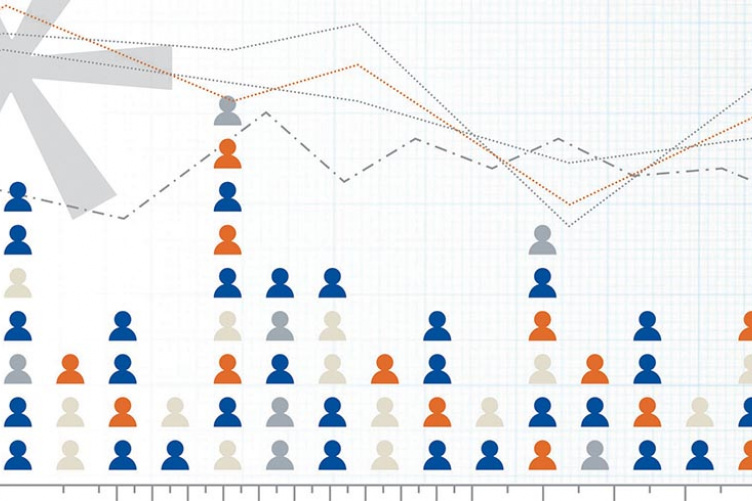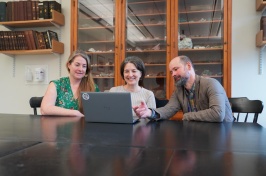
This past November,4,405,000 people with disabilities in the U.S.had jobs. That’s 300,000, or four percent, more people with disabilities who worked than in November 2015, but still just 31.1 percent of total working-age people with disabilities.
And Andrew Houtenville ’97G has counted each of them.
Not literally, of course, but Houtenville—director of research at UNH’s Institute on Disability (IOD) and an associate professor of economics at the Paul College of Business and Economics—leads several national projects that collect powerful data like these to serve up directly to those who can make a difference in the lives of people with disabilities.
“We basically go out and get every possible statistic available from the myriad government agencies that generate them,” says Houtenville, a graduate of UNH’s economics doctoral program. “Our goal is to improve the lives of and opportunities afforded to people with disabilities, to support independent living and equal opportunity in employment, in healthcare—really, in all aspects of life.”
In doing so, Houtenville and his team, which includes IOD research assistant professor Deborah Brucker and partners Mathematica Policy Research, the Association of University Centers on Disabilities, the Kessler Foundation and the American Association of People with Disabilities, have created a one-stop shop for policymakers, advocates and researchers. The two major research projects he leads, both funded by the U.S. Department of Health and Human Services National Institute on Disability, Independent Living, and Rehabilitation Research, have made the IOD a national leader in disability statistics.
While Houtenville and Brucker tap these data to publish the peer-reviewed papers that are the coin of the academic realm, the statistics also fuel UNH’s land-grant mission.
“We write research papers for academic journals that move the science forward, but we also do the outreach part and work closely with advocacy organizations, so it’s not just dust on the shelves,” he says.
Toward that end, the team releases an Annual Disability Statistics Compendium and hosts a major conference in Washington to help policymakers and advocates use the statistics to advance the field and the lives of those with disabilities.
In 2015, for instance, the U.S. Department of Justice (USDOJ) used these data to demonstrate the impact of non-inclusive employment policy in Oregon. The state of Oregon settled a lawsuit with the USDOJ, in part due to Houtenville’s findings; Oregon is now working on adopting policy reforms to ensure that people with disabilities are employed in competitive jobs.
And each month the IOD and Kessler Foundation issue the National Trends in Disability Employment, or nTIDE, Report, accompanied by a webcast, that parses Bureau of Labor Statistics employment data to assess employment by working-age people with disabilities.
Employment, with its inextricable links to wealth, poverty and wellness, provides a powerful lens through which to view the lives of people with disabilities, who work at about half the rate those without disabilities do, Houtenville says.For the past 40 years, that rate has been on a frustrating slide, and Houtenville and the IOD have also had a loud voice in the academic debate and policy solutions to that decline.
“The consensus among economists is that the Social Security Disability Insurance program and the Supplemental Security program provide a very basic level of income support, but it’s very hard to get off those programs once you’re on them,” he says, noting that it can take several years to gain access to the programs. “Once you’ve spent two years telling the federal government you’re disabled and you can’t work, and you’ve been out of the labor force two years, it is very hard to reenter the workforce. There’s also fear that once you go back to work you’ll lose your benefits right away.”
Houtenville has been involved in the creation of policy aimed at changing how people with disabilities receive those Social Security benefits and expanding employment opportunities. Analyzing the current policies that support these programs,he notes that their structure provides a strong disincentive to work, promoting what he calls “in-home institutionalization.” The policy he is helping to craft proposes an incremental, not total, loss of Social Security benefits upon return to employment.
Bucking the number-obsessed stereotype of statisticians, Houtenville calls himself a scholar-advocate. “Some people would shrink at that statement, but I use my scholarship to advocate by choosing what hypothesis I want to test, by investigating what I think is important,” he says. “I can’t use it to choose the answers. I use scholarly principles to identify the questions.”
-
Written By:
Beth Potier | UNH Marketing | beth.potier@unh.edu | 2-1566





















































